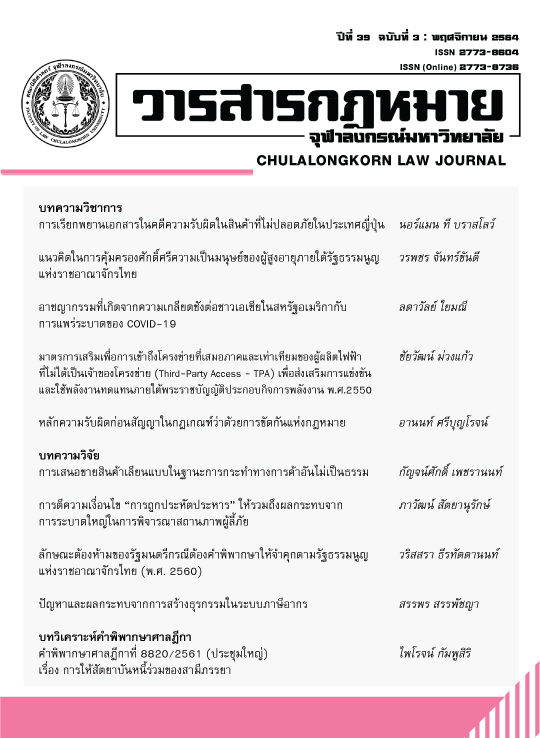Document Production in Japanese Strict Product Liability Cases
Main Article Content
Abstract
The 1994 Japanese product liability law was amended to eliminate the plaintiff’s requirement to prove negligence or intent on the part of the defendant. However, the plaintiff still must prove the product was defective. Does the current law of civil procedure enable the plaintiff to do so effectively? Using a hypothetical automobile accident case wherein documents held by the manufacturer are essential to prove defective design or manufacture, we conclude it will be very difficult for the plaintiff to obtain the documents as prove the defect.
Besides other production issues, the critical sections of the Code of Civil Procedure preventing effective document production are Sections 196 and 220 which shield documents from discovery containing “trade secrets” and documents created for the use of the holder. Some efforts to expand the scope of discovery as recommended in the 2001 Justice Reform Council have not effectively eliminated or reduced this problem.
We suggest significant modification and expansion of discovery in product liability cases is necessary, in particular regarding CCP sections 196 and 220. The underlying institutional opposition to wider discovery is partly the minimal role of the parties and the active role of the judges in Roman law based civil law jurisdictions. The other more important opposition is the fear of discovery abuse as thought to be in the United States. We believe these objections are surmountable.
United States experience indicates discovery abuse can be prevented in large part by coordinated actions by both the judiciary and the Bar Association. The judiciary would have to be given the power to impose sanctions of both contempt of court for egregious discovery abuse, as well as monitory penalties. The Bar Associations then would have to become active in imposing professional sanctions on attorneys based on judicial contempt orders.
Article Details
The copyright in this website and the material on this website (including without limitation the text, computer code, artwork, photographs, images, music, audio material, video material and audio-visual material on this website) is owned by Chulalongkorn University Law Journal and its licensors.
1. Chulalongkorn University Law Journal grants to you a worldwide non-exclusive royalty-free revocable license to:
- view this website and the material on this website on a computer or mobile device via a web browser;
- copy and store this website and the material on this website in your web browser cache memory; and
- print pages from this website for your use.
- All articles published by Chulalongkorn University Law Journal are licensed under the Creative Commons Attribution 4.0 International License. This permits anyone to copy, redistribute, remix, transmit and adapt the work provided the original work and source is appropriately cited.
2. Chulalongkorn University Law Journal does not grant you any other rights in relation to this website or the material on this website. In other words, all other rights are reserved. For the avoidance of doubt, you must not adapt, edit, change, transform, publish, republish, distribute, redistribute, broadcast, rebroadcast or show or play in public this website or the material on this website (in any form or media) without appropriately and conspicuously citing the original work and source or Chulalongkorn University Law Journal prior written permission.
3. You may request permission to use the copyright materials on this website by writing to journal@law.chula.ac.th.
4. Chulalongkorn University Law Journal takes the protection of its copyright very seriously. If Chulalongkorn University Law Journal discovers that you have used its copyright materials in contravention of the license above, Chulalongkorn University Law Journal may bring legal proceedings against you seeking monetary damages and an injunction to stop you using those materials. You could also be ordered to pay legal costs.
If you become aware of any use of Chulalongkorn University Law Journal's copyright materials that contravenes or may contravene the license above or any material on the website that you believe infringes your or any other person's copyright, please report this by email to journal@law.chula.ac.th.


